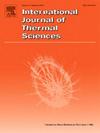非高斯噪声下参与介质中随时间变化的热通量和温度分布的快速无创测量
IF 5
2区 工程技术
Q1 ENGINEERING, MECHANICAL
International Journal of Thermal Sciences
Pub Date : 2025-06-27
DOI:10.1016/j.ijthermalsci.2025.110112
引用次数: 0
摘要
针对高超声速飞行器热防护系统(TPS)气动热通量和温度场的实时估计问题,提出了粒子滤波(PF)和扩展粒子滤波(EPF)技术。TPS被认为是典型的参与介质。采用Rosseland扩散模型计算了参与介质中的辐射换热。利用有限体积法求解能量方程,得到测量温度。在测量温度信号的基础上,应用粒子滤波技术重构了TPS的表面热流场和内部温度场。在模拟温度信号中加入4种典型的非高斯噪声,考察了所提算法的跟踪能力和稳定性。详细讨论了被测噪声、被测噪声协方差、过程噪声协方差、时间步长和粒子个数对估计结果的影响。计算结果表明,即使考虑NASA实际测量的随时间变化的热流密度,基于EPF和PF技术仍然可以获得可接受的估计结果。PF和EPF重建的实际热流密度归一化均方根误差分别为5.45%和2.55%,重建温度场的平均相对误差分别为0.1%和0.043%。结果表明,EPF方法比PF方法具有更好的跟踪能力和鲁棒性。本文章由计算机程序翻译,如有差异,请以英文原文为准。
Rapid non-invasive measurement of the time-dependent heat flux and temperature distribution in participating medium under non-Gaussian noise
The particle filter (PF) and extended particle filter (EPF) techniques are proposed to resolve the real-time estimated of the aerothermal heat flux and temperature fields of the thermal protection system (TPS) for the hypersonic vehicle. The TPS is regarded as a typical participating medium. The radiation heat transfer in the participating medium is computed by the Rosseland diffusion model. The finite volume method is utilized to solve the energy equation to obtain measurement temperature. Based on the measurement temperature signal, the Particle filtering technique is applied to reconstruct the surface heat flux and inner temperature field of the TPS. Four typical non-Gaussian noises are added to the simulated temperature signal to investigate the tracking ability and stability of the proposed algorithms. The influence of the measured noise, measured noised covariance, process noise covariance, time step, and number of the particle on the estimated results are discussed in detail. The calculated results indicate that even though the actual time-dependent heat flux measured by NASA is considered, an acceptable estimated result can still be obtained based on the EPF and PF techniques. The normalized root mean square errors of the actual heat flux reconstructed by PF and EPF are 5.45 % and 2.55 %, and the average relative errors of the reconstructed temperature field are 0.1 % and 0.043 %, respectively. All the estimation results illustrate that EPF technique has better tracking ability and robustness compare with the PF method.
求助全文
通过发布文献求助,成功后即可免费获取论文全文。
去求助
来源期刊

International Journal of Thermal Sciences
工程技术-工程:机械
CiteScore
8.10
自引率
11.10%
发文量
531
审稿时长
55 days
期刊介绍:
The International Journal of Thermal Sciences is a journal devoted to the publication of fundamental studies on the physics of transfer processes in general, with an emphasis on thermal aspects and also applied research on various processes, energy systems and the environment. Articles are published in English and French, and are subject to peer review.
The fundamental subjects considered within the scope of the journal are:
* Heat and relevant mass transfer at all scales (nano, micro and macro) and in all types of material (heterogeneous, composites, biological,...) and fluid flow
* Forced, natural or mixed convection in reactive or non-reactive media
* Single or multi–phase fluid flow with or without phase change
* Near–and far–field radiative heat transfer
* Combined modes of heat transfer in complex systems (for example, plasmas, biological, geological,...)
* Multiscale modelling
The applied research topics include:
* Heat exchangers, heat pipes, cooling processes
* Transport phenomena taking place in industrial processes (chemical, food and agricultural, metallurgical, space and aeronautical, automobile industries)
* Nano–and micro–technology for energy, space, biosystems and devices
* Heat transport analysis in advanced systems
* Impact of energy–related processes on environment, and emerging energy systems
The study of thermophysical properties of materials and fluids, thermal measurement techniques, inverse methods, and the developments of experimental methods are within the scope of the International Journal of Thermal Sciences which also covers the modelling, and numerical methods applied to thermal transfer.
 求助内容:
求助内容: 应助结果提醒方式:
应助结果提醒方式:


